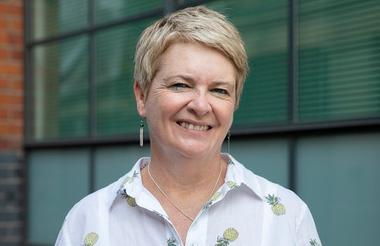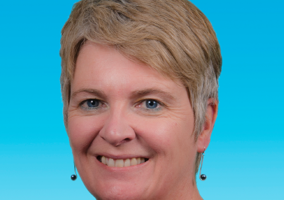After joining one of the country’s largest social care charities two months before the Covid-19 pandemic began, Edel Harris is belatedly able to plan for the future.
While the effects of the pandemic are still being felt and a cost-of-living crisis has presented fresh challenges, Harris is slowly turning Mencap’s emphasis towards research and campaigning.
She is also helping to fundraise, having recently swum a marathon distance in the open air, dressed as a superhero for the final stages, and raising more than £5,000 for the charity.
Harris believes charities should be treated more like businesses and that the sector should be recognised by policy-makers, with whom she worked closely during the pandemic, as “significant contributor to the economy”.
Pre-charity career
Harris was born into a Catholic family of eight children in Ireland in the 1960s. Her family were homeless when she was very young and her father was out of work. Towards the end of the decade, her father was offered a prison officer job, which came with a house, and they moved to England.
She says the move to live in village on the outskirts of Bristol was “very positive” overall, however she and her family faced some discrimination from the locals. Her “most vivid memory” of this was when Lord Mountbatten was assassinated by the IRA in 1979.
“My father was very ostracised at work. We lived on a prison officers’ estate; other children wouldn't walk to school with us.”
Besides her seven siblings, Harris also shared her home with foster children. “My parents were foster parents, so I grew up in a house that was always full of children, which was interesting.”
Harris left school at 17 to join the Metropolitan Police cadets. “It was never ever discussed in our family that university was an option, I imagine because we were quite poor,” she says. Harris says her decision to join the police, where she worked for 11 years, was “naïve” and not driven by her father’s profession. “I suppose I did have a leaning towards public service but at 17 I can't honestly say I’d given it an awful lot of thought.”
In the police service, Harris received “really good training” in matters such as child protection and domestic violence and made “lifelong friends”. Nonetheless, she found the job “quite shocking” at first and had some “unpleasant” experiences “that all female officers probably experienced at some point”.
“If you think back to the 1980s, being a woman in the police was quite a challenge. It’s sad when you see the reports now about what’s happening – the misogyny and the racism – and I get quite depressed, thinking: ‘Gosh, all these years and things haven't changed.’”
Harris’ eldest son, Ross, was born with Fragile X syndrome, the most common form of inherited learning disability. When Ross was 18 months old, Harris decided to give up work and moved with her family to Scotland, where her husband’s parents lived. After having a second son, Harris did an Open University degree in health and social care, which led to a five-year stint working for the NHS in public health.
“I was working on a health and homelessness action plan and was quite frustrated that the health of the homeless person had not been improved as a result of us having an action plan. I'd worked alongside some homeless charities to create the plan and I decided that I wanted to work in the charity sector when there was more potential to have a bigger impact.”
Harris entered the sector at a relatively senior level as deputy chief executive of homelessness and youth unemployment charity Aberdeen Foyer. She then moved to her first chief executive role at Scottish social care charity Cornerstone, which she led for 11 years before joining Mencap in January 2020.
She found working in the charity sector more rewarding than her earlier career “almost immediately” because she had the “freedom to have a vision or an idea and to be able to see it through”.
Joining Mencap at the start of a pandemic
Harris became Mencap’s chief executive eight weeks before the UK’s first Covid-19 lockdown.
She says it was an “incredibly difficult” time to join Mencap but “far more” challenging for her frontline social care worker colleagues who went “way above and beyond whatever one could imagine of them”.
“But yes, to be a new CEO in a large organisation, and one that was at the sharp end of dealing with the pandemic was tough. I also ended up being separated from my family because I stayed in London, which seemed like the right thing to do, thinking lockdown was going to be three weeks. I ended up being on my own for I think about 11 weeks in total, which obviously was challenging not just for me, but for my family, particularly for Ross.”
At Mencap, some workers slept on hospital floors to support vulnerable people who were dying in their care. Some staff experienced trauma from being prevented from saying a proper goodbye to beneficiaries, while some lost their lives working for the charity during the pandemic.
A mixed experience
Mencap experienced closer political engagement than ever before as Harris held weekly meetings with the care minister and deputy chief medical officer during the early stages of the pandemic.
Harris says she and her colleagues were “inputting as much as we could to the decisions they were taking”. And they did so successfully, encouraging the government to change its original positions on Do Not Attempt Resuscitation notices, vaccination priorities and clinical guidance to better consider people with learning disabilities.
Overall, Harris found speaking to ministers “a mixed experience”. She says she “did not always agree with the political decisions” that care minister Helen Whately was making “but I did get the sense that she was prepared to listen and try to understand some of the challenges”.
Financially, the charity faired reasonably well, increasing its income in both 2020-21 and the year afterwards.
Harris says costs increased with the charity spending millions of pounds on PPE and topping up furlough payments to ensure staff received 100% of their contracted salary, though the government’s Covid support grants helped to cover those costs.
“They really, really helped and covered some of those additional costs like PPE, like paying our colleagues who had to shield or were on furlough, paying people who couldn't come to work because they tested [positive for Covid] – all those sorts of issues were covered by the Covid grants.
“And then the second factor was fundraising. Again, you'd almost imagine that something like a pandemic would have the opposite effect. But actually, we had one of the best, if not the best fundraising years we've ever had.”
£15m liability resolved
Another challenge Harris faced when she joined Mencap was a court case involving one of its former employees that the charity feared could leave it with a £15m bill if it were to lose and have similar financial implications for other social care organisations such as Cornerstone.
The Supreme Court ruled in favour of Mencap in March last year, which focused on whether overnight “sleep-in shift” social workers were entitled to the national minimum wage (NMW) or if the lower flat-rate that the charity had historically paid instead would suffice.
Harris says “initial anxiety” among Mencap employees regarding the court case has reduced by the time of the judgment.
“[The potential £15m liability] really hampered Mencap for many years prior to my appointment, because we weren't in a position to really invest. And obviously, a liability of that type puts any organisation at some degree of risk. So, I would say that the workforce relationships with the executive team and the board at the time were good. But obviously, there was a lot of anxiety in anticipation of which way the court case was going to go.”
Mencap did not “celebrate” the victory and Harris instead responded to the ruling by calling on the government to reform “out of date and unfair” payment laws for sleep-in shifts.
The charity itself began paying top-up fees for sleep-in shifts in 2017, whereby it topped up all hours worked to the national minimum wage. Mencap has now replaced the “complicated” and “universally disliked system” with a new arrangement. “In partnership with our workforce, we now play pay a flat rate for a sleep-in and an enhanced hourly rate for hours worked during the day, and obviously, it's all aligned to and complies with the legislation.”
Harris says she is “quite proud of our hourly rates at the moment because they are, on average, higher than the median rate for the sector”. She says the charity would like to increase pay further but “we just don't receive enough funding to pay our colleagues any more than we currently do”.
A shift in focus
With the potentially backpay liability issue settled, in April 2021 Harris published Mencap’s ‘Big Plan’ for the next five years, which includes a shift in the charity’s focus.
The 76-year-old charity plans to work “in a different way” to achieve its overarching objective to make the UK “the best place in the world for people with a learning disability to live happy and healthy lives”.
“Overall, we're doing less direct service delivery, and putting an emphasis more on our research and our campaigning work,” says Harris.
“So inevitably, when any organisation goes through change, there will be some structural changes.”
Harris says there’s “no agenda to downsize” in terms of staff but it has decided “to stop delivering some services”.
“In those cases, we either transitioned services to other providers, or we've worked with people affected and their families, to ensure that was a positive outcome.”
Harris wants the charity to become more “community-focused” and “play a much more facilitative role in supporting people with a learning disability to be champions in their own community”.
Mencap also plans to “upskill [its] support workers” to enable them to spend “more time with people they support and less time on all the paperwork that's required”.
Diversity not always ‘visible to the naked eye’
Harris says Mencap aims to be representative of the communities that it serves by having “a range of lived experience and diversity at all levels of the organisation”.
In the wider charity sector, Harris predicts that it will “take some time” for it to become more diverse.
“When I'm meeting with other CEOs of some of the major charities in the UK, as a group, we are not reflective of the societies that we serve,” she says.
“But there is also an issue about certain assumptions which are made about people and their backgrounds and their lived experience. So, I think we shouldn't be too quick to judge necessarily just by what we see in person, but take the time to find out about their background and their lived experience, because there may actually be a little bit more diversity than is visible to the naked eye.”
Related articles












